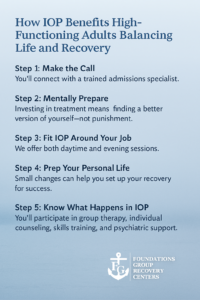You’ve kept things running—on the outside. Job? Check. Bills paid? Check. Functioning enough that people probably wouldn’t guess there’s a problem? Double check. But you feel it. That hum of anxiety, the after-work drinks turning into something more, or the prescription pills becoming a quiet habit that’s harder to break than you expected.
It’s easy to tell yourself you’re “not that bad,” but you’re here, reading this, because you know something needs to shift. Maybe you’ve heard of an intensive outpatient program (IOP) and wondered if it could fit your life—your busy, professional, responsibilities-don’t-stop life.
At Foundations Group Recovery Center in Mashpee, MA, we’ve helped hundreds of high-functioning adults make the quiet but powerful decision to reclaim control. IOP is designed for exactly this—people like you who need meaningful support but can’t press “pause” on life. Here’s a direct, honest guide on how to actually get started.
Step 1: Make the Call—Your First Step Is Just a Conversation
You don’t need to prepare a speech or know all the answers before you reach out. The first step toward IOP is as simple as having a conversation.
When you contact Foundations Group Recovery Center, you’ll talk to a trained admissions specialist—not a robot, not a call center. We’ll ask you some basic questions:
- What’s been going on?
- What do you want help with?
- What’s your daily life like?
You don’t need to label yourself an alcoholic or an addict if you don’t want to. You can be honest without overexplaining. You’ll also get to ask us questions—about the schedule, about treatment options, about how it works. This isn’t a test. It’s just the first bridge from surviving to actually feeling good again.
Step 2: Mentally Prepare—This Is About Upgrading Your Life, Not Pausing It
A lot of high-functioning people hesitate with IOP because it feels like “What if this means I’m broken?” Let’s get something clear: this isn’t a punishment, it’s an investment.
Intensive outpatient programs in Massachusetts are built for people who are still functioning but want to function better—people who don’t want to hit rock bottom, people who want to feel steady, confident, and in control again.
Mentally, prepare by reminding yourself:
- You’re choosing a structured reset, not an indefinite pause.
- You’re not giving up your life, you’re making it easier to enjoy it without crutches.
- You’re not “checking out,” you’re checking back into your own well-being.
Your first big win in recovery happens before day one—it’s the decision to choose yourself.
Step 3: Look at Your Work Schedule—IOP Can Fit Around It
The biggest hesitation most high-functioning people have is this: “How do I make treatment work with my job?” Good news: IOP is designed to be flexible.
At Foundations, we offer both daytime and evening IOP sessions to make sure people can continue working, parenting, or managing responsibilities. Treatment is usually three to five days per week for a few hours each session.
Pro tips for prepping your work life:
- Block off time on your calendar for treatment hours.
- If you feel comfortable, ask HR about medical leave options like FMLA for extra flexibility.
- You can also just say you have ongoing health appointments—no need to over-disclose if you don’t want to.
- Look at IOP as a productivity boost, because functioning while quietly drowning is exhausting. Getting healthy improves your performance, not the other way around.
Step 4: Prep Your Personal Life—Small Changes Set You Up to Win
Your environment can make or break early recovery. You don’t need to become a monk, but prepping your personal life can make a huge difference.
Simple ways to set yourself up:
- Clean out your fridge and cabinets of obvious triggers (alcohol, pills, etc.).
- Tell one or two trusted people you’re starting IOP—they don’t need to have all the details, but it helps to have someone in your corner.
- Plan easy, nourishing meals and carve out downtime. IOP is work—it’s not uncommon to feel emotionally tired after sessions.
- Limit commitments that drain you and focus on stability while you get your footing.
This isn’t about overhauling your entire life. It’s about clearing space for the version of you that feels good again.
Step 5: Know What Happens in IOP—Structure Without Isolation
So what actually happens during IOP? Here’s a snapshot of what to expect:
- Group Therapy: This is where you realize you’re not alone. You’ll hear others with similar struggles and get practical tools to handle cravings, stress, and triggers.
- Individual Counseling: One-on-one sessions to dig deeper into personal challenges and goals.
- Skills Development: Expect CBT (Cognitive Behavioral Therapy), DBT (Dialectical Behavior Therapy), mindfulness training, relapse prevention strategies, and more.
- Psychiatric Support: If needed, you’ll also have access to medication management to help stabilize mental health symptoms like anxiety or depression.
Think of IOP like a gym for your mental health. You go in, work on the weak spots, get stronger, and leave feeling better each week.
Step 6: Take It Week by Week—Don’t Overthink the Timeline
One common question we get: “How long do I have to do this?” The truth? You don’t have to think about the entire timeline. Focus on showing up for the first week.
IOP typically lasts between 4–8 weeks, depending on your needs. Some people transition to less frequent sessions after that (intensive outpatient is not forever).
When you show up for that first week, you’ll notice the small shifts: fewer racing thoughts, fewer mornings of regret, more moments of actual peace. Those wins build momentum—and before you know it, life doesn’t feel like a grind anymore.
FAQs: Common Questions About Getting Started in IOP
Do I have to quit my job to do IOP?
Nope. One of the biggest benefits of IOP is that you can still work. Most people fit IOP sessions around their work schedules, especially with evening options available.
What if my drinking or drug use isn’t “that bad”?
If it’s affecting your quality of life, your focus, or your relationships, it’s enough to get help. You don’t need to hit rock bottom. IOP is about taking back control early.
Is IOP inpatient or outpatient?
It’s outpatient. You go to treatment a few hours a day, multiple times per week, and you return home after. No overnight stays, no disconnecting from your life.
Do I have to go to group therapy?
Yes, group is a big part of IOP—but most people end up liking it. You’ll quickly see that it’s not awkward or preachy—it’s honest, relatable, and helpful.
How do I get started?
Easy. Call the admissions team, have a simple conversation, and we’ll guide you step-by-step from there. No pressure, no judgment.
Final Thought: You Don’t Need to Crash to Get Back on Track
We see it every day at Foundations Group Recovery Center in Mashpee, MA: high-functioning people deciding to stop the slide before it gets worse. IOP is a chance to get clear-headed, re-centered, and show up for your life in a way that actually feels good.
If you’re feeling stuck but still moving, IOP could be your turning point. You don’t have to figure it all out alone.
Call (844)763-4966 or visit Contact Us to learn more about our intensive outpatient program services in Mashpee, MA.


